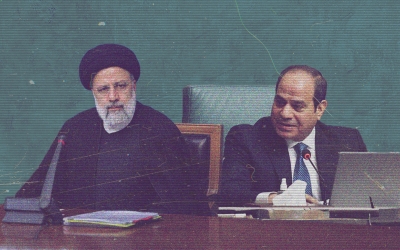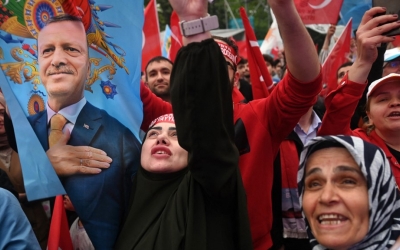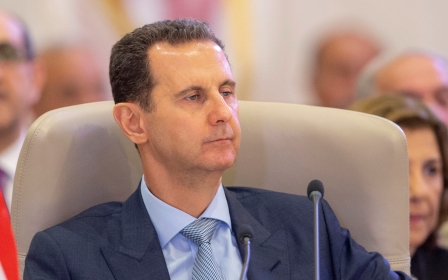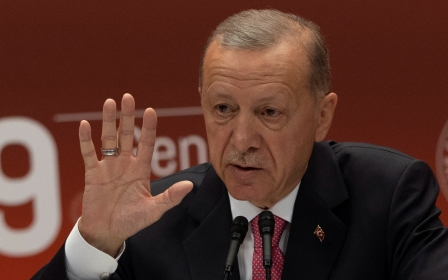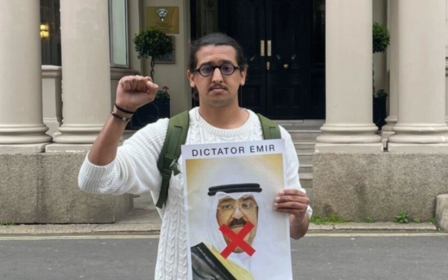Arabic press review: Erdogan's win set to speed up Turkey-Egypt rapprochement
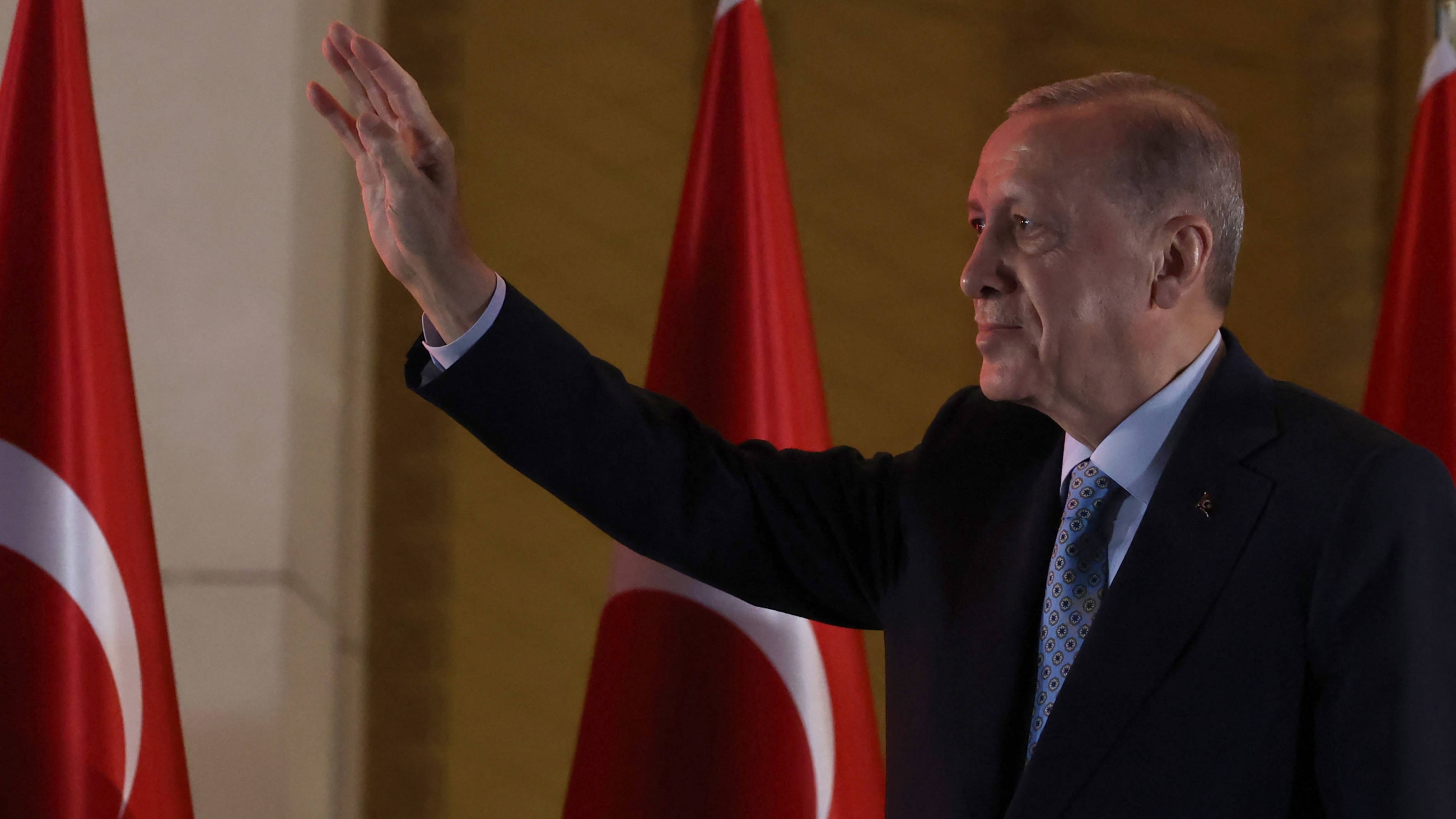
Sisi congratulates Erdogan on victory
The re-election of Turkish President Recep Tayyip Erdogan is expected to accelerate the normalisation of relations between Ankara and Cairo after years of fractured ties, according to a report by Arabi21.
Egyptian President Abdel Fattah el-Sisi has called Erdogan to congratulate him on his presidential win last week. It was their second call since February, when Sisi called the Turkish leader to offer his condolences for the victims of the earthquakes that hit Turkey.
During the call on Monday, the presidents agreed to strengthen ties and cooperation, and to immediately start upgrading diplomatic relations and exchanging ambassadors, Egypt's presidency said in a statement.
Relations between Ankara and Cairo have been fractured for nearly a decade. Turkey refused to recognise Sisi as Egypt's legitimate leader following a 2013 military coup that ousted his predecessor, Mohamed Morsi, the country's first democratically elected president.
In November last year, Erdogan indicated that he would re-evaluate relations with Egypt and Syria after domestic presidential and parliamentary elections.
"The Turkish elections demonstrated Erdogan's strength, leadership and popularity, which prompted the Egyptian administration to accelerate the pace of normalising relations with Turkey, even though they had hoped for Erdogan's defeat in the elections and the victory of his opponent," Egyptian politician Khaled al-Sharif was quoted as saying by Arabi21.
"Erdogan's successes in the Libyan issue in preventing a military coup... and the rise of Turkey's power under Erdogan's regional and international leadership... have pushed the Egyptian administration to follow in the footsteps of the countries normalising relations with Turkey and acknowledging the reality," Sharif added.
In April, Egyptian foreign minister Sameh Shoukry met his Turkish counterpart Mevlut Cavusoglu in Turkey, where they agreed on a specific time frame to raise the level of diplomatic relations and prepare for a summit between the two presidents.
Riyadh to mediate between Syria and West
Saudi Arabia is seeking to mediate between Syria and the West after the return of Damascus to the Arab League last month, according to the Lebanese newspaper Al-Akhbar.
"Western sanctions represent a major obstacle to the path of normalising relations and reconstruction, and Riyadh is seeking to play the role of mediator," Al-Akhbar reported.
Saudi Arabia currently prioritises the "expansion of humanitarian exceptions by the West" in exchange for the Syrian government facilitating and allowing more aid to enter Syria through border crossings.
The newspaper added that the matter of refugees returning to Syria appears to be among the most complex and difficult issues to address.
Syria's membership of the Arab League was suspended in 2011 after a brutal crackdown on protests against President Bashar al-Assad led to a devastating civil war.
More than 14 million Syrians have fled their homes, and about 6.8 million remain displaced in their own country since 2011, according to UNHCR. About 5.5 million Syrian refugees live in neighbouring Turkey, Jordan, Iraq, Lebanon and Egypt.
In May, Syrian President Bashar al-Assad was given a warm welcome at the Arab summit.
Some Arab states, including the United Arab Emirates, have been pushing for Syria and Assad's rehabilitation since last year, but a decision by Saudi Arabia and Iran, Assad's ally, to resume ties in March shifted the political landscape.
Kuwait to deport 50 Filipinos a day
Kuwait and the Philippines have agreed to start deporting 50 Filipino workers to Manila daily, amid a long-running dispute over worker protections and employer rights.
A source at the Philippine embassy in Kuwait said more than 400 workers, all women, were transferred from shelters to the Talha prison for deportation, the Kuwaiti newspaper Al-Jarida reported.
"The embassy has taken care of the cost of flight tickets for the deportees, which will amount to 400,000 dollars," a source told the daily.
The crisis between the two countries came after Kuwait suspended visas for domestic workers due to "the wrong practices" by the Philippines embassy.
Kuwait accused the Philippines of breaking several labour agreements between the two countries and "playing the role of state institutions".
The alleged violations include housing abused workers in embassy-run shelters, looking for women who had run away without informing local authorities, communicating with Kuwaiti citizens without permission and pressuring employers to add clauses to work contracts.
The Kuwaiti government has demanded an official commitment on the part of Manila to not repeat these violations.
Manila had stopped sending first-time workers to Kuwait after the charred dead body of Filipino worker Jullebee Ranara was found in the desert in January this year.
Commenting on the issue, Kuwaiti Interior Minister Sheikh Talal Al-Khaled said Kuwait's sovereignty and the dignity of its people are a "red line", and confirmed his country's commitment to the agreements signed with Manila.
* Arabic press review is a digest of news reports not independently verified as accurate by Middle East Eye.
Middle East Eye propose une couverture et une analyse indépendantes et incomparables du Moyen-Orient, de l’Afrique du Nord et d’autres régions du monde. Pour en savoir plus sur la reprise de ce contenu et les frais qui s’appliquent, veuillez remplir ce formulaire [en anglais]. Pour en savoir plus sur MEE, cliquez ici [en anglais].


